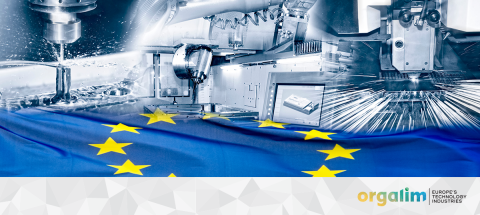EU 'net-zero' Industrial Plan must leverage the full power of the market to succeed
1 February 2023

The European Commission has today presented its Green Deal Industrial Plan, which aims to ensure Europe leads the way in the global transformation to a net-zero industrial age. Orgalim fully supports the plan's aim to provide a more supportive environment for the scaling up of the EU's manufacturing capacity for the net-zero technologies and products required to meet Europe's ambitious climate targets.
Commenting on the plan, Malte Lohan, Orgalim's Director General, said: "Europe’s future prosperity and its ability to reach net zero depend on a radical transformation of its economy, based on going fully electric and revolutionising our manufacturing base. Other major economies have already understood this and are moving fast, and Europe cannot afford to fall behind."
The Industrial Plan sets out a number of critical steps, including streamlined permitting rules and public funding for renewable energy, a push to enhance skills among the workforce, and a renewed focus on working with international trade partners and allies to strengthen supply chain resilience.
Orgalim welcomes the ambition of the plan and its emphasis on a common European approach. Crucially, the enormous economic transformation required will only succeed if Europe leverages the full power of the market. We highlight three priorities for a vibrant, resilient and globally competitive European net-zero industry:
First, for a realistic path to net zero by 2050 while maintaining living standards, Europe doesn’t just need to decarbonise its energy system. It also needs to do more with less. Technologies that will unlock major gains in energy and resource efficiency at a systemic level, such as those required for electrification, sector coupling and advanced manufacturing, should be part of the Industrial Plan.
Europe’s future prosperity and its ability to reach net zero depend on a radical transformation of its economy, based on going fully electric and revolutionising our manufacturing base.
Second, the right balance is needed between public subsidies and private investments required for the transition. By the EU’s own calculations, €477 billion of additional annual investments by 2030 are needed in the energy system and transport sectors alone, on top of the historical annual average. Given the practical and economic obstacles, as well as the profound risks for long-term competitiveness and integrity of the single market, it is inconceivable that these and other required investments would come from subsidies. This means the scale of private investments will have to be at a greater order of magnitude than anything we see today.
Third, to unlock the massive private investments required, the Industrial Plan needs to go much further in ensuring the future competitiveness of Europe’s net-zero industry. Investing in Europe’s future industrial base must be profitable. This primarily concerns the regulatory burden applying to the range of technologies required to reach net-zero industry. Burdensome and unpredictable regulation has become one of the biggest obstacles to investments in clean technologies in Europe, especially for the smaller companies that will continue to be the backbone of its industrial base. Removing unnecessary and disproportionate regulatory obstacles, and meaningfully screening incoming legislation for its competitiveness impact on net-zero industries, must be a priority.
Orgalim will engage actively to advance the views of Europe’s clean and high-tech manufacturing sectors as the plan takes shape.

LATEST NEWS
How can we create a dynamic, competitive European high-tech manufacturing base?
Orgalim's key recommendations offer policymake...
